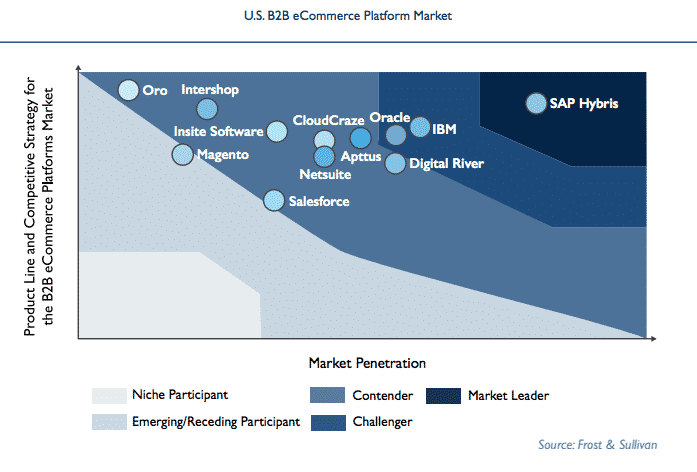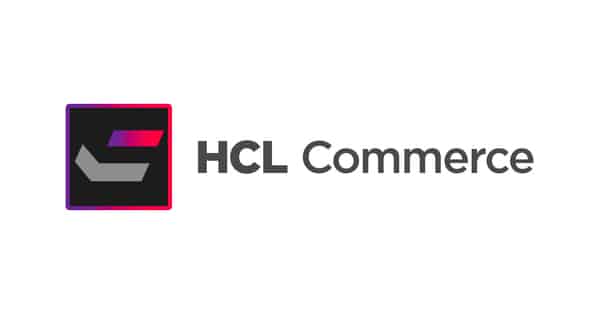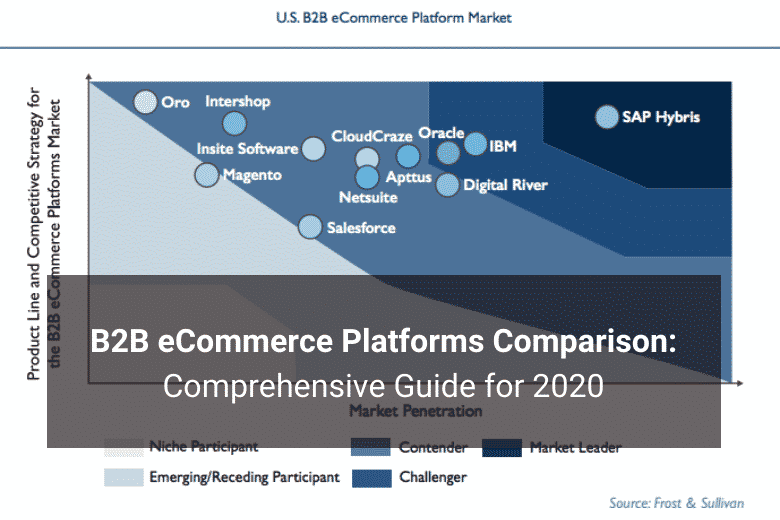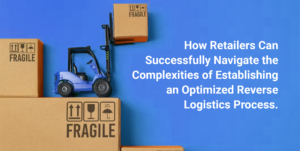If you are a manufacturer, wholesaler, distributor or other B2b seller, you have unique needs when it comes to eCommerce. B2C eCommerce platform features simply don’t mesh with how you do business. The plethora of B2C eCommerce platforms masquerading as B2B makes a real B2B eCommerce platform comparison difficult. Use this guide to compare enterprise eCommerce platforms and pick the best B2B eCommerce solution for you.
Key Specifications to Compare
When evaluating B2B eCommerce solutions on the Enterprise level, there are more considerations than just features and functions. You need to know how the solution is deployed and the extent of the support you can expect from your technology partners. You need to look at the solution’s ecosystem as well. Here are some of the functions, features, and other key specifications you need to review to make an apples to apples Enterprise B2B eCommerce platform comparison.
Integration. At the Enterprise level, the ability of the solution to integrate in your existing architecture is key. Unless the platform selection is part of an entire digital transformation of the company, the B2B eCommerce platform you choose must work well with your ERP, CRM, 3PL PIM and other current solutions. The availability of integration partners and APIs is also a factor.
Deployment models. In the B2B world, one size does not fit all. You may want a solution that can be deployed on-premise now or in the cloud in the future. Maybe you’re ready to move to a cloud-based solution right now. Either way, as your business grows, your processing needs will grow as well. Make sure you have the flexibility to deploy when and where you have the resources. Also, pick a solution that can easily scale to accommodate your ambitions for growth.
Customization. No solution is going to come out of the box with the exact functionality and set-up you need. That would be just too easy! Because you know you will need customization, look for modular design, flexible architecture, and a powerful workflow engine so you can adapt the software to reflect how you do business. Also, the easier a solution is to customize, the lower the implementation costs.
User friendly interfaces. The best B2B eCommerce software understands that it must interface with two different sets of users. There are the customers on the frontend and the administrators and company staff on the backend. Both need to find the information they need efficiently and intuitively, but they have very different needs. Look for a solution that provides the functionality your customers want in a way they want to interact while still providing an easy to use backend for marketing, sales, and customer service employees.
Price. Of course, cost is a prime consideration. But when it comes to Enterprise eCommerce platforms there is more to consider than just licensing fees. You need to factor in development fees for integration and customization. The richer the ecosystem of extensions and plugins and the more features that come out of the box the lower your total cost of ownership. That’s because the faster you can get up and running, the sooner you begin to recoup your costs. Look out for transaction fees as well. Some platforms charge a transaction fee for every sale made through the website.
Best B2B eCommerce Platforms List in 2020
Now that you know what to consider, let’s look at the best B2B eCommerce software available today.

OroCommerce

OroCommerce is the only eCommerce platform that was made specifically for all types of B2B. It’s built by the same people that developed Magento, so you know it’s reliable. It is available for on-premise or cloud deployment. Because it scales with you, it won’t inhibit or limit your growth. It is an open source solution with a rich ecosystem of extensions, plugins, and APIs. That means it’s easy to find an integration partner and the platform easily integrates with your existing architecture. Customizing is easy and you can develop workflows that conform to your procedures. There are no transaction fees and because it comes out of the box with most features you need, the time to ROI is quick.
HCL Commerce (ex- IBM WebSphere)

Designed with Enterprise level B2B eCommerce in mind, HCL Commerce is a cloud-based platform that can be deployed with a traditional or headless architecture. V7 was owned by IBM and marketed as Websphere Commerce, so you may still find reviews under that name. V9 includes digital marketing tools and support for omnichannel sales. Requires extensive development support to implement and is on the pricey side. This solution only makes sense for the Enterprise level sellers for which it was designed.
SAP Commerce Cloud (ex- Hybris)

Until recently, this product was known as Hybris, and you may still find some reviews under that name. Like OroCommerce, SAP’s Commerce offering includes an integrated CRM. It can also be deployed in the SAP Cloud or on-premise. It’s highly customizable, has a robust content management system, and integrates easily with the SAP ERP and other SAP solutions. On the downside, it is pricey but at least there are no transaction fees.
NetSuite SuiteCommerce
This cloud-based solution integrates seamlessly with the NetSuite ERP because it is built on the ERP platform. That’s great if NetSuite is your ERP; it’s not so great if it isn’t. That’s because ERP integration is required for features such as converting an RFP to an order to work properly. On the plus side, the solution easily supports B2B and B2C commerce. The platform can be customized and deployed quickly.
Salesforce Cloud Commerce

Built on the Salesforce platform, SFCC is a cloud-based solution that integrates with the Salesforce CRM as well as Marketing Cloud and Sales Cloud. An on-premise deployment is not available. It scales to easily handle Enterprise level commerce and supports multiple business models. What it lacks in features it makes up for in easy integrations. For example, while customized marketing features may be weak, it easily integrates with Qubit to fulfill that need.
Magento Commerce

Magento is a leading provider in the eCommerce platform space. It has a large ecosystem and integrates well with ERPs. You can deploy in the cloud or on premise. But if you opt for on-premise, be warned it is a resource hog. Because it is a well-established product, you’ll find a large ecosystem for extensions and integrations and many solution and integration partners from which to choose. Of course, those customizations will come at a price that drives up the cost of ownership.
Comparison Table for Enterprise B2B eCommerce Platforms
| B2B eCommerce Platform | Open Source? | Cloud and On-Premise Options? | Time to Market | Integration | Customization | Multiple Business Models |
| OroCommerce | Yes | Yes | 4+ months | A | A | A |
| HCL Commerce (IBM Webshpere) | No | No | 6+ months | C | C | B |
| SAP Commerce Cloud (Hybris) | No | No | 9+ months | A | C | A |
| NetSuite Suite Commerce | No | No | 9+ months | A | C | A |
| Salesforce Cloud Commerce | No | No | 6+ months | A | C | C |
| Magento Commerce | Yes | Yes | 5+ months | A | B | B |
We hope you find this simplified B2B ecommerce platform comparison chart useful.
Conclusion
In the B2B eCommerce space, you’ll find plenty of contenders. The top B2B eCommerce platforms all have their own strengths and weaknesses. When picking the right solution, look beyond your current needs to select a platform that can easily scale with you. To hold down implementation costs and speed the time to ROI, look for easy customization and integration.
Looking for a B2B eCommerce fulfillment solution?
Floship is a leading eCommerce order fulfillment provider based in Hong Kong. We help both B2C and B2B companies store, pick, pack and ship their orders worldwide. Reach out for a free consultation and we’ll go over some strategies to help you ship faster and more affordable.

Ready To Upgrade Your Logistic Solution?
Speak to Floship ecommerce logistic consultant about improving your global support chain today





